A tale of teamwork and determination: Kral’s Council, MLBB Champion of D1 Cup S2
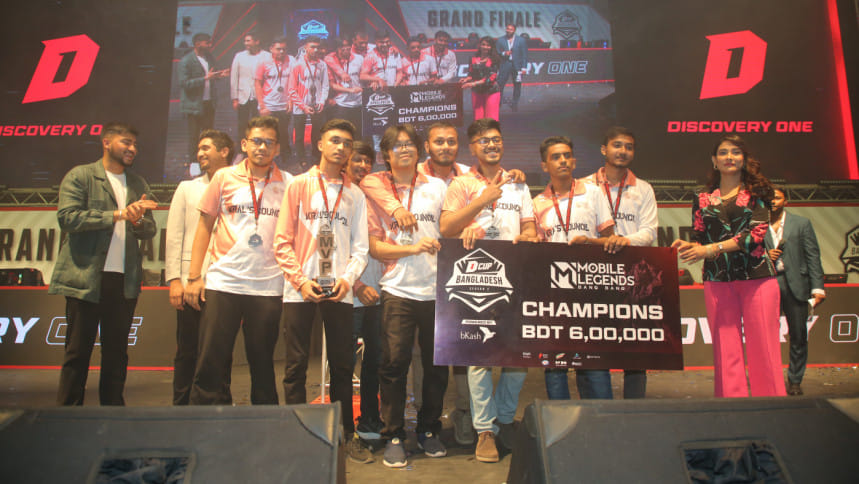
Esports, once a niche pastime, is now a global phenomenon, and at its heart are the elite players who have dedicated themselves to the virtual arena. Thousands of gamers are now actively participating in competitive esports tournaments.
In September this year, local fans and gamers were treated to the "country's largest" esports tournament, the Discovery One Cup Season 2. There, in the Mobile Legends (MLBB) section - competing against over 120 teams - the group called 'Kral's Council' emerged victorious, earning a cash prize of BDT 6 lakh.
Members of this team are Esrak Hasan Rifat, Arafat Hossain, Karib Ahmed, Arjon Talukdar, Rubayet Ahmed, and Ainan Bin Shahid. In this exclusive interview with 'Kral's Council', we delve into their journey, their triumphs, and the passions that drive them to excel in a rapidly evolving world and what is next for them.
How did you start playing 'Mobile Legends: Bang Bang' competitively?
We started playing this game after our friends introduced it to us. After playing a few matches, it looked like a lot of fun. Over time, we began to understand the game's mechanics, different characters, and how to work effectively as a team. After playing for some years as casual players, we found that we were performing like the gamers of top-level squads in Bangladesh, eventually coming across the local esports community.
Tell us about the beginning of 'Kral's Council'. How was this team formed?
Soon after we got the hang of the local competitive scene, we began playing versus established top teams. We believed in our ability and formed a squad to officially participate in competitions. We started with four founding members at the end of 2021, eventually making some changes in our roster and ending up with the current six that we have now.
What is your experience regarding competing in the local esports scene?
Esports is still quite unrecognised in our country. When we started playing competitively, family pressure was a big problem that we had to deal with. They didn't like that we were spending our time playing games; unaware of the international esports scenario. Also, internet and ping issues are the hardest obstacles to overcome in an online game. It feels painful when we play against international teams with better internet connections. Also, at the beginning of the introduction of competitive esports in Bangladesh, there were management issues. Over time, this has improved, and there are people now actively working for the betterment of the local esports community.
How did you as a team overcome the challenges that you faced?
As it is a game consisting of five players, team synergy is very crucial. Every player needs to work hard and practise together to create that synergy, and so, we had to train and study to adapt ourselves to the ever-changing meta of the game. More importantly, it is a mental game, so we had to change rosters at times to retain the required mental resilience.
What was your most challenging match in the tournament?
The most challenging match was against Team Crisis Requital (MLT CR). We were 1-0 down but ended up doing a reverse sweep to clinch the win. We played as a team and that was the deciding factor here.
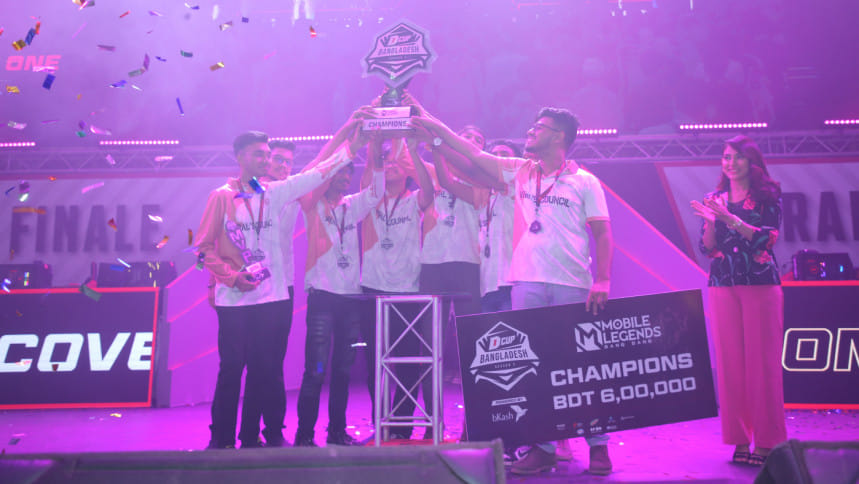
What do you think sets your team apart from others in the local MLBB scene?
We spent countless hours in the game as we believe that talent can't do anything if you don't put your hard work into it. We also rely on our exceptional teamwork and communication, honed through countless hours of practice and trust-building, which allows us to execute complex strategies effectively. Even after a loss, we review our gameplay, identify mistakes, and work on them to prevent repeating them in the future. We believe that every loss makes us stronger.
Are there any upcoming tournaments or goals you are focusing on?
Winning the D1 Cup Season 2 tournament was a significant achievement for our team, and we are thrilled about the success. Our immediate focus is to continue refining our strategies, maintaining our competitive edge, and strengthening our team dynamics. We are also looking forward to participating in upcoming international tournaments, alongside the next MBC, which is our only way to participate in the World Cup representing Bangladesh.
Esports often involves sponsorships. Do you have any sponsors?
Unfortunately, no. In countries like Saudi Arabia, Malaysia, Nepal, or even Myanmar, newly formed teams get sponsors even without any notable achievements. But here in Bangladesh, esports teams have to keep searching on their own to find sponsors; proving how esports is still unrecognised in this country. We are hoping to get a sponsor as big tournaments are coming up soon.
What are your opinions on the competitive esports scenario in Bangladesh?
The esports scenario in Bangladesh is growing rapidly. There was a time when only a few teams were active in our esports community, nut now it has grown very quickly and people are enthusiastic about it. However, as we pointed out before, people still need to recognise this sector. More organisations need to sponsor the teams so hidden talents can be sufficiently nurtured. Initiatives like an esports hub or learning camp would be a great opportunity for our gamers, and would also help make competitive gaming accessible to everyone regardless of gender, background, or economic status.
As all of you are students, do you see esports as a career option?
In other countries, gamers and esports players earn millions by competing in esports tournaments or streaming their gameplay. But we don't get a single penny after spending a good amount of time learning mechanics, creating strategies and analysing the gameplay of the best esports players in the world.
Our families often tell us to look out for something that would financially support us. Sadly, many talented gamers had to leave the esports scenario as they were forced to become the breadwinner for their family. Unless any significant changes happen in the esports arena of our country, we are afraid that we also have to meet the same fate.
How do you suggest Bangladesh should implement the necessary changes to make competitive esports a viable career option for aspiring full-time gamers?
As other countries have started investing in esports, we believe we also need the same level of support from our government. Firstly, we yearn for official recognition of esports as a legitimate sport, which can pave the way for financial support and infrastructure development in our country.
We also need access to resources which would be possible with sponsorships and investment. Teams worldwide can hire coaches and analysts with an immense level of financial support they get from their sponsors and government. Also, more sponsorships will create esports as a viable career option in our country. With the right changes, we can create a vibrant esports scene that benefits players and the country as a whole.
What advice would you offer to those who aim to reach the level of success your team has achieved?
From our experience, we have seen that players easily get demotivated after some failures. More importantly, they don't want to give enough time in the game. So, dedicate yourself to relentless practice and improvement, cultivate a strong work ethic, stay open to learning and adapting, prioritise teamwork and communication, and maintain mental resilience in the face of challenges.
Moreover, you can't compromise practising countless hours in the game even though you face failures at the beginning. Set clear goals, remain passionate about your game, and never lose sight of your objectives. Remember that success is a journey that demands unwavering commitment, patience, and the ability to stay humble, embracing both wins and losses as opportunities for growth.

 For all latest news, follow The Daily Star's Google News channel.
For all latest news, follow The Daily Star's Google News channel. 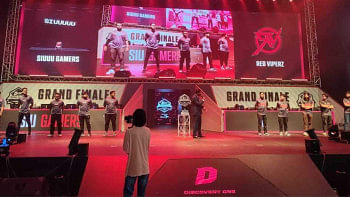


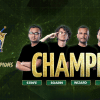



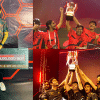


Comments